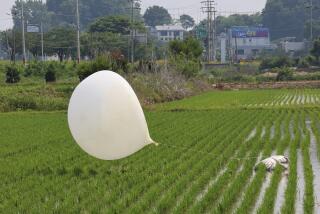Korea’s Expanding Circle of Fear : Famine looms in north-- and that worries Seoul and Washington
North Korea, facing the prospect of widespread starvation as a result of devastating floods that left it short millions of tons of rice, may be preparing a new political crackdown to control a population growing increasingly desperate.
Once, news that the country’s Stalinist regime felt its control threatened would have been unreservedly welcomed in Seoul and Washington. Now that possibility is raising concerns. North Korea has moved troops, tanks and warplanes closer to the demilitarized zone, its boundary with South Korea since the Korean War ended more than 42 years ago. There is always the chance--slight, but credible--that a despotic government fearing famine-induced unrest could try to restart that war in a reckless effort to keep its 23 million people in line.
Kim Jong Il, the seldom seen and almost never heard “Great Leader,” this week launched an attack against unidentified “traitors” whom he accused of “vilifying revolutionary seniors and defaming their ideas and accomplishments.” It seems clear--insofar as any political development in a society as opaque as North Korea’s can be clear--that this message seeks to reassure the Communist elite, including top military leaders, that both their status and the rigid ideology they have helped impose on North Korea for half a century would be protected againstchanges that younger technocrats might be eager to launch. Add to that recent U.S. intelligence reports of increasing public executions of accused dissenters and it appears likely that, however serious the food problems, North Korea’s leaders are not planning any reformist moves.
North Korea does remain interested in getting food aid from outside. The release of captive South Korean fishermen on Tuesday should at least make it politically easier for Seoul, along with other suppliers, to resume some rice shipments. But U.N. experts put North Korea’s rice deficit at a whopping 4 million tons. Almost certainly it will come up short in getting outside help. The threat of instability remains strong. Washington, preoccupied for now with Bosnia, must continue keeping a wary eye on the long-tense Korean peninsula.
More to Read
Sign up for Essential California
The most important California stories and recommendations in your inbox every morning.
You may occasionally receive promotional content from the Los Angeles Times.










